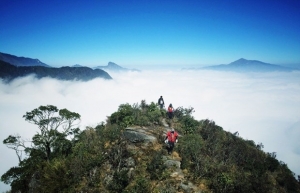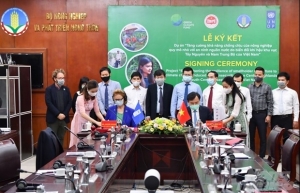Vietnamese children at high risk of climate crisis impacts
 |
| Countries are urged to go greener |
“The Climate Crisis Is a Child Rights Crisis: Introducing the Children’s Climate Risk Index” is the first comprehensive analysis of climate risk from a child’s perspective. It ranks countries based on children’s exposure to climate and environmental shocks, such as cyclones and heatwaves, as well as their vulnerability to those shocks, based on their access to essential services.
The report found that Vietnamese children are highly exposed to air pollution and flooding. It calls for investments in climate action and environmental protection that will secure development gains and ensure a sustainable future for children. In addition, measures such as a COVID-19 green recovery, improved access to safe water, and climate education can make a significant difference in our ability to safeguard children’s futures from the impacts of climate change.
“The climate crisis is a child’s rights crisis,” said Lesley Miller, UNICEF Vietnam Deputy Representative. “Vietnam is becoming a more hazardous place for children to live due to climate change and environmental pollution, but if we act now we can prevent it from becoming worse. Ensuring adequate safety nets and accessible, resilient services – such as water, healthcare and education – will help to protect children’s futures.”
“The frightening environmental changes we are seeing across the planet are being driven by a few but experienced by many,” said Lesley Miller. “Vietnamese children and young people are concerned about the threat climate change and environmental degradation poses to their future. They are calling on world leaders to act decisively in order to reduce greenhouse gas emissions and work as a global community to build a better world for all children.”
The report finds approximately one billion children – nearly half the world's 2.2 billion children – live in one of the 33 countries classified as “extremely high-risk”. The findings reflect the number of children impacted is likely to get worse as the impacts of climate change accelerate.
Without the urgent action required to reduce greenhouse gas emissions, children will continue to suffer the most. Compared to adults, children require more food and water per unit of body weight, are less able to survive extreme weather events, and are more susceptible to toxic chemicals, temperature changes, and diseases, among other factors.
What the stars mean:
★ Poor ★ ★ Promising ★★★ Good ★★★★ Very good ★★★★★ Exceptional
Related Contents
Latest News
More News
- Vingroup consults on carbon credits for electric vehicle charging network (January 28, 2026 | 11:04)
- Bac Ai Pumped Storage Hydropower Plant to enter peak construction phase (January 27, 2026 | 08:00)
- ASEAN could scale up sustainable aviation fuel by 2050 (January 24, 2026 | 10:19)
- 64,000 hectares of sea allocated for offshore wind surveys (January 22, 2026 | 20:23)
- EVN secures financing for Quang Trach II LNG power plant (January 17, 2026 | 15:55)
- PC1 teams up with DENZAI on regional wind projects (January 16, 2026 | 21:18)
- Innovation and ESG practices drive green transition in the digital era (January 16, 2026 | 16:51)
- Bac Ai hydropower works stay on track despite holiday period (January 16, 2026 | 16:19)
- Fugro extends MoU with PTSC G&S to support offshore wind growth (January 14, 2026 | 15:59)
- Pacifico Energy starts commercial operations at Sunpro Wind Farm in Mekong Delta (January 12, 2026 | 14:01)





 Tag:
Tag:
























 Mobile Version
Mobile Version